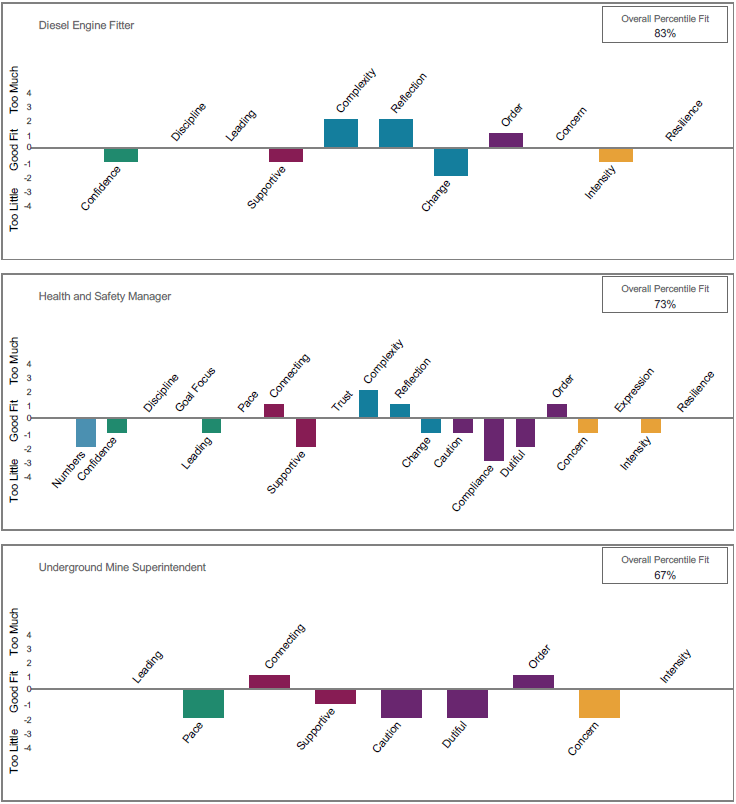Understanding Psychometric Testing: What It Measures and Why It Matters
Selection of the best fit candidate for your role is critical
Psychometric assessments can be used in all types of organisations to help avoid the cost of a bad hire, from the small to medium or emerging business to the largest of private organisations and government departments. Without objective insights from standardised and valid psychometric tests and assessments, we open the door up to hasty and subjective decisions, unconscious bias, and ultimately – the very costly bad hire.
Mapien psychologists have years of experience guiding our clients, navigating the noise and providing clear direction to achieve the best hire possible. Our specialty is our service and interpretation, providing clear advice and direction in language anybody can understand. Our psychological reports and skilled consultants provide concise and impactful direction.

Psychometric Assessment Services
A poor hiring decision can significantly affect your team’s productivity and morale, potentially costing more than twice the annual salary of the mis-hire in recruitment, training, and lost productivity. Mapien’s Psychometric Assessment Services cut through the complexity of hiring. Our psychologists act as precise guides, interpreting data to help you secure the right candidate efficiently.
With clear, actionable advice and concise psychological insights, we ensure that you’re equipped to make informed decisions without the jargon. Trust Mapien to help you minimise the risks associated with recruitment, making the process straightforward and effective.
What does the Mapien Radar test?
Personality preferences, when measured with a valid and scientifically backed tool, can reliably predict how a person is likely to think, feel, and behave at work, providing powerful insight into likely job fit.
Personality is measured via Habitus (powered by People Excellence), a robust and valid, but concise personality test, maximising insight, but also simplifying the experience for the candidate.
General mental ability, or cognitive ability, has been shown through over 100 years of research to be one of the strongest overall predictors of ability and workplace performance. The strength of this measure is how widely applicable it is, predicting performance across the vast majority of role types, role levels, and industries. Cognitive ability is measured by Foresight (powered by People Excellence), a robust and valid tool that gives candidates a direct line of sight into what is being asked in a work context, while ensuring a reasonable challenge and differentiation between candidates. Its workplace-focused questions for verbal reasoning, abstract reasoning, and numerical reasoning, ensure candidates are assessed on their ability to solve the most appropriate problems, giving you the best insight and them the best experience.
Both assessments can be brought together to provide a Job Fit score against the behavioural and ability needs of jobs across close to 1,000 job families*, and allow for the assessment of job fit for almost any role you can imagine. *job families derived from the Occupational Information Network, or O*NET.
The Mapien Radar results wheel (left image) provides a snapshot overall of problem solving and likely behaviour at work.

The Job Fit scores (right image) provide a single score to show the likely overall job fit for the role you are looking to fill.

Mapien Radar approaches
How psychometric assessments and testing work
These assessments are based on psychological theory and use standardised tasks or questions. Respondents’ answers are then compared against norm groups to ensure the results are objective and reliable. This process helps identify individuals’ strengths, weaknesses, and suitability for specific roles or development paths.
How to prepare for psychometric testing
Preparing for psychometric testing is an important step in ensuring you present your skills and personality accurately. These tests are designed to assess your cognitive abilities, personality traits, and suitability for a role.
While you can’t “study” for these assessments in the traditional sense, familiarising yourself with the format, practising similar questions, and ensuring you’re in the right mindset can significantly impact your performance.
For tips on preparation and what to expect during psychometric testing, please refer to our test taking guides.
Types of psychometric testing
- Cognitive Ability Tests: Measure logical reasoning, problem-solving skills, and the ability to process information.
- Personality Assessments: Evaluate behavioural styles, preferences, and personality traits.
- Emotional Intelligence Tests: Assess an individual’s ability to understand and manage emotions in themselves and others.
- Skills Assessments: Focus on specific competencies or technical abilities relevant to the job.
- Interest Inventories: Identify career fields and roles that align with an individual’s interests and motivations.
These tests provide insights into how an individual may perform in a role, interact with a team, and fit within an organisation’s culture.
Key Team Members
Explore More Insights: Related Reads on Psychometric Assessments
Discover More: Dive into Our Psychometric Assessments Blog CategoryFAQs
What are Psychometric Assessments?
Psychometric assessments are standardised methods scientifically designed to measure individuals’ abilities and behavioural preferences. They leverage peer-reviewed research to ensure validity and reliability.
How are Psychometric Assessments Used in the Workplace?
They’re primarily used in two areas: recruitment and selection for gauging aptitude and fit, and personal development for identifying strengths and growth opportunities. However there are growing numbers of psychometrically developed and robust assessments for other purposes, for example Mapien’s Psychosocial Assessment Tool (MPAT).
Why is Relevance and Integration Important in Psychometric Testing?
Tests must be relevant, measuring criteria critical to the role, and should not be used in isolation. They’re most effective when integrated with other assessment methods for a holistic view of a candidate or employee.
Should results of psychometric assessments be kept confidential?
Yes, the results of psychometric assessments should remain appropriately confidential. This confidentiality extends to both the participation in the process and the data generated from the assessments.
Is the participation in psychometric assessments kept confidential?
Yes, participation in the assessment process is also kept confidential. This means that the fact that a candidate participated in testing should not be shared with other candidates, close contacts, or their existing employer without consent.
Why is confidentiality important in psychometric assessments?
Confidentiality is a core tenet of managing psychological information. It ensures that the test-taker’s data is not misused, exposed publicly, or utilised for purposes beyond what was consented to. This practice applies across all realms of psychological practice, regardless of the employer or setting.
Who has access to the psychometric assessment data?
Access to the data is restricted to key stakeholders, namely the client representative who requested the testing, the test supplier, and the test-taker. Any reports or summaries based on the assessment data belong to the client or the testing organisation, but the core data provided by the test-taker is controlled by the test-taker.
Can a test-taker request to have their data deleted?
Yes, the test-taker can request to have their core data deleted or otherwise removed.
Can candidates receive feedback on their assessment outcomes?
Candidates and participants have the right to request feedback on the outcomes of their testing. They can be provided with a ‘candidate-friendly’ version of the report or verbal feedback.
How should the data from psychometric assessments be stored?
The data must be stored safely and only used for the purposes outlined when seeking informed consent from the test-taker.


